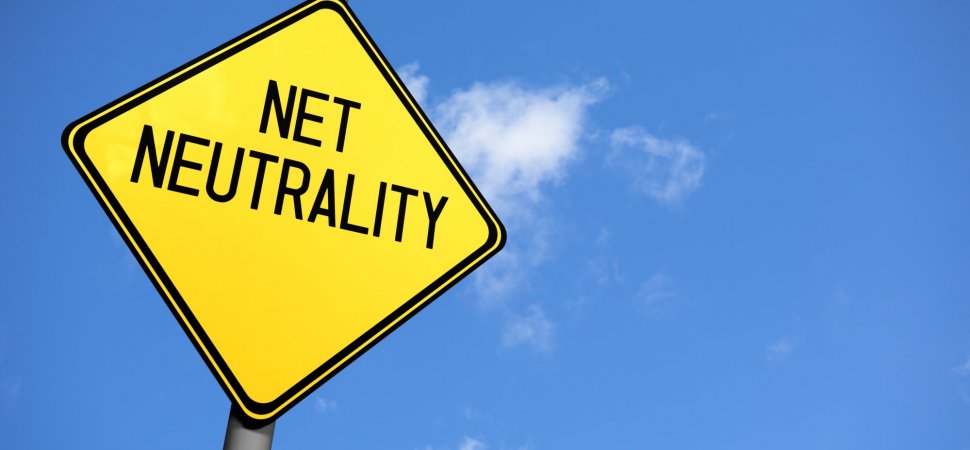
Everyone’s up in arms because the Federal Communications Commission this week released its final proposal to reverse the Obama Administration’s “net neutrality” rules. The proposal is scheduled for a December 14th vote.
“Net neutrality” means that the entire internet should be able to be equally accessed and used by anyone – individuals or businesses for essentially the same price. The Obama-era ruling classified the internet as a “public utility” which supports this model. The new rules, called “Restoring Internet Freedom,” would reverse the 2015 ruling and put the internet back into private hands.
Opponents of these rules argue that by doing so big companies like Comcast and Verizon will take advantage of the public, charge more money, give preference to larger companies over start-ups and otherwise be in full control of the information super-highway. I guess all of this could happen – assuming we’re watching an updated version of The Matrix or a future episode of Mr. Robot. But the reality is the opposite. The Restoring Internet Freedom rules are good for businesses – big and small – and for three significant reasons.
Reason One: The Internet Will Be Faster.
Say, like me, you’re flying last week from Philadelphia to San Francisco and you want to get online. The only service available is GoGo Internet and the cost was a whopping $40. Yes, I said $40! Of course that makes me grumble, not just because of the cost but because I’ve never been a fan of GoGo’s less-than-stellar performance. But I needed to get online and I could afford it. So I did. And you know what? It was beautiful. Fast. Responsive. For less than $10 an hour I was extremely productive. Why so good?
Because I bet I was one of the few on that flight to pay for this service and wasn’t fighting against a bunch of other people taking up bandwidth. Everyone else had the choice and most decided to wait for the internet they get at home or at a free public wi-fi spot. Good for them. Good for me. Large internet service providers like Comcast and Verizon plan to have “fast lanes” for those that need it and want to pay for it. This is no different than a turnpike toll for drivers who want to get to their destination quicker or a delivery charge for people like me who are too lazy to go out and pick up their own food. You want something faster…you pay. And the companies providing this service have the incentive to make it as fast as possible. Which brings me to my next reason.
Reason Two: It Will Encourage Investment
People say “Oh that Comcast, they make plenty of money.” These are people who don’t know a thing about business. Comcast is not making “plenty of money.” They’re doing great, for sure. But the money they’re making is paying back the investments they incurred over decades to build and buy the infrastructure that is the backbone of their network. Sure, a good amount of their earnings fall into the pockets of their shareholders (hooray for capitalism, and for the millions of middle class participants in pension funds that own their shares) and of course into the salaries for their tens of thousands of employees and the payments made to an equal if not greater number of contractors, vendors and suppliers (many of them are small businesses, by the way).
So let them make their money. In fact…encourage them to make more! Don’t take away their assets and give control to the government. Let them keep building and improving and making them as fast as possible. Sure, they should charge more for their best services. But the rest of us will still benefit from their investments just like we’ve benefiting over the past 30 years without the government controlling them. The minute that an investment in a public utility shows a lower return, a private company will divert its resources to something that makes more money – and from that we’ll all suffer.
Reason Three: Yes, The Government Is Still Watching
For goodness sake everyone this is America, not China. The new rules specifically give the Federal Trade Commission oversight over the internet service providers. This is an independent agency of the government whose principle mission is to protect the consumer and prevent anti-competitive practices. The bi-partisan commission has more than 1,100 employees and has successfully won lawsuits against some of the country’s biggest companies practicing monopolistic activities.
If Comcast or Verizon hike their rates, bully their customers or otherwise get out of line you can bet the internet will be aflame with accusations and complaints. People will yell and the FTC will certainly listen. In fact, I’ll bet that it will be easier and faster for the FTC (and other state agencies) to change any potentially nefarious practices committed by these companies than if these companies were part of the government’s “public utility” infrastructure and were protected by federal rules.
Do consumers really need the internet like we do electricity, water and heat? Isn’t their enough free and inexpensive internet available around for when we do? Shouldn’t businesses have more choices over the type of internet service they need to deliver their products and services? Does the government need to be in the middle of this? I say no. Let the private sector keep doing what they’ve already done so well. And let them profit. They can’t grow and succeed without us.
